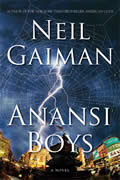Fat Charlie really doesn't like his nickname. For one thing, he's not fat, and hasn't been since a brief period in his adolescence. For another thing, he can't manage to get rid of it. You see, his father called him that, and for some reason names his father give stick. Fat Charlie also isn't particularly fond of his father. He's not an evil person. He's just hideously embarassing, and has been all of Fat Charlie's life. He delighted in playing pranks on Fat Charlie throughout his childhood, many of which were embarassing indeed.
However, Fat Charlie doesn't mind his life. He has a fiancé and a not uncomfortable life, even if he's never been particularly successful. He does hate his job, and particularly his boss, but he manages.
Then his father dies, in a particularly embarassing way. And after the funeral, he discovers that his father was a god. Anansi, to be precise, the African spider trickster god. Also, he has a brother that he never knew about, a brother who is a god himself, who's outgoing and dynamic and cool and all of the things Fat Charlie isn't. A brother who he makes the mistake of getting in touch with. And then his life starts falling apart. Birds and lions rejoin their ancient wars with spiders, reality ends up being more malleable than Fat Charlie had ever realized, and he discovers just how evil a stoat can be.
Neil Gaiman has gone from a comic book writer with cult popularity to someone whose books debut at the top of the New York Times best-seller list, and every step along the way has been well-deserved. Anansi Boys is his latest and one of the most anticipated novels of 2005. It lives up to the hype, but at the same time it may not be the book that people were expecting.
First, it's not a sequel, prequel, or in any way related to American Gods, except that Mr. Nancy (Anansi) appears in both books. The capability of gods is vaguely similar, but the tone, the subject matter, and the style of the book are significantly different and there is no connection of plot. It is also not a heavy book; in fact, it's the most light-hearted adult book from Gaiman since Stardust and in tone feels more like Good Omens (without, of course, the Pratchett). There isn't much of Gaiman's surprisingly deep philosophy, nor the borderline horror that turns up in places in American Gods.
What this is instead is a delightful, humorous homage to the Anansi stories of west African folklore, the stories that many Americans know best in their Uncle Remus Br'er Rabbit version (and Gaiman points out several times how silly it is to confuse a rabbit and a spider). It's a book full of moral ambiguities, strange characters, animal gods, and dry wit in the face of absurdity. It's a book about breaking out of a normal life, taking riskier choices, and defeating brute violence through intelligent cunning and trickery. It's also a book that comments on the stupidity of flamingoes. At first I was a touch disappointed that Anansi Boys didn't have the philosophical depth of some of Gaiman's earlier work, but it's so much fun that I couldn't help but forgive it.
Much of the charm of this book is Gaiman's mastery of metaphor. Rather than simply use a metaphor as part of a description, Gaiman plays with them, leading the reader by the hand into the heart of the absurd truth and expanding on the metaphor just enough to leave one laughing and nodding at the same time.
"I won't live forever," sniffed her mother, in a way that implied that she had every intention of living forever, getting harder and thinner and more stonelike as she went, and eating less and less, until she would be able to live on nothing more than air and wax fruit and spite.
And yet, he never belabors the point, knowing just when to let it go and move on. It's a delight, and only one of the many proofs of Gaiman's writing skill that shine through every line. Regardless of theme, Gaiman is simply an excellent writer and storyteller, and he captures the entertainment and moral barbs of an oral tradition wonderfully.
I don't know if all of this will survive to a paperback printing, but the hardcover of Anansi Boys is also beautifully typeset and laid out. It is one of the most beautifully readable books I've read recently, sufficiently so that it stands out from the pack. It's full of little touches like carefully chosen varying font sizes for Gaiman's chapter subtitles or Gaiman's own sketch of a spider on the last page, and the font, layout, and section markings are uniformly readable and clear. William Morrow did a commendable job.
For those who have read Gaiman's other work, Anansi Boys will feel like a new story from an old friend. For those who haven't, I think it falls short of his best work by a hair but it would be an excellent introduction. The people are a bit more exaggerated and the morals less disguised, which means it didn't leave me thinking about people and philosophy for as long afterwards as Gaiman has in the past, but the delight of the humor and quality of the writing makes up for that. Arachnophobes will have difficulty with a few scenes; otherwise, recommended for readers of nearly any taste. If you like fantasy, mythology, and fairy tale at all, Gaiman won't disappoint.
Reviewed: 2005-12-30
